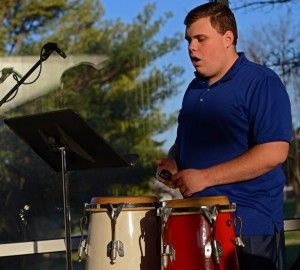Center for autism and spectrum disorders facing possible demise

April 21, 2015
April 2 was World Autism Awareness Day. It is typically a day of reflection, but this year, the day was celebrated by Gov. Bruce Rauner’s announcement to freeze funding for the cause.
The announcement directly impacts The Autism Program of Illinois, or TAP, which funds 19 centers across the state, including SIU’s Center for Autism and Spectrum Disorders.
Lisa Schippers, a graduate student who works in the center, said it could close as early as June 30, and three of the four professional speech pathologists and behavioral analysts have received termination letters.
Advertisement
The center serves 150 families in southern Illinois with early intervention in children as young as 2. There are 17 children enrolled in intensive speech and behavioral therapy programs, and the same number of adolescents and adults enrolled in rehabilitation and counseling programs, said Valerie Boyer, the director of the Center for Autism and Spectrum Disorders.
The majority of funding for the center comes from TAP. With no state funding, the program will no longer be able to support Illinois autism centers, meaning families would need to travel as far as Paducah, Ky. or Indianapolis for treatment.
Sarah Hazel, whose son is in the center’s early intervention program, said it is essential.
“I have a son who was non-social,” said Hazel, who lives in Marion. “It’s like bringing your kid to school twice a week — but he’s too young for public school so this is all the help that we can get.”
Schippers, a graduate student in speech pathology from the Quad Cities, said one of the main reasons many students chose SIU is because of the center’s location on campus. Rauner’s decision, and the impending closure of the center, could force prospective students to attend out-of-state universities.
Schippers said there are misconceptions about the scope of autism.
“A lot of people think that children with autism can get the help they need when they’re enrolled in public school and that’s just not true,” she said. “It’s not the schools’ fault, the earlier you make the diagnosis the better chance they have of improving their social skills.”
Advertisement*
The center holds its sessions twice a week for an hour and a half. But it is recommended that children are helped for 20 to 30 hours a week.
For the other 27 hours, the center educates the parents for work outside of the sessions. The center has a plethora of literature and resources for parents to learn strategies and apply them while working with their children at home.
Providing students clinical experience is another one of the ways the center works with SIU. More than 100 students, in fields including speech pathology and childhood psychology, are involved in observational focused training, and 25 students work with the professionals in counseling the children.
“We were diagnosed in the fall of 2014,” Hazel said. “My son’s made so much progress since he’s gotten here. He was non-social, now he can interact with the counselors, and really enjoy his time here.”
More than 3.5 million Americans live with Autism Spectrum Disorder, and about 1 in 68 children have been identified with it. Autism services cost U.S. citizens between $236 billion to $262 billion annually, according to autism-society.org.
Evan Jones can be reached at e[email protected]
Advertisement







